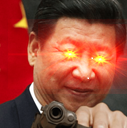is this and this only: supporting the status quo, but disagreeing on minor points, so that while receiving the plaudits than go along with holding the majority opinion, they can feel (somewhere in their pathetic TV-poisoned minds) that they are “brave” and “intelligent.” It is the ancient gambit used by every would-be intellectual who desires to to be popular as well: “Yes, I agree with you all, but not for precisely the same reasons. Would you perhaps like to hear what I think?” These words, when spoken aloud, are always in that back-of-the-throat drawl which, in American English, signifies considered thought and long acquaintance with books, and of course a string of letters at the end of one’s name.
Thus we get the typical liberal position on anything. “I sympathize with the Palestinians, and the policies of the Israeli government are certainly to be criticized, but all civilized people should denounce Hamas because nothing justifies terrorism!” Or: “Yes, Ukraine has a problem with corruption, and there is a troubling right-wing element in their military, but we still need to side with them because Russia is much worse!” Always there is the ghost of an acknowledgement that the situation is complex – a cheap rhetorical trick – and then doubling down on the socially acceptable position. The ultimate in this stupid game is the invocation of an equally stupid phrase, “two things can be bad at once, mkay?” – which always means in practice that the side America supports is actually the less bad of the two ostensible evils.
Hence we “tankies” are always accused, by liberals, of having for great revolutionaries of the past a wholly uncritical admiration. This is manifestly false, for nearly every discussion among Marxist-Leninists at some point devolves into a picking apart of historical minutiae, with the goal of finding what Mao or Stalin or Honnecker did right or wrong. We are one of the few political groups that does not spare our heroes. But when liberals ask us to approach Mao with “nuance,” what they mean is: admit Mao was a bloodthirsty tyrant who ate babies for breakfast and never brushed his teeth, but he also ended footbinding. Hence the historical record is “complicated.” We Marxists, of course, will not engage in such asinities, and we state openly that Mao’s successes far outnumber and outweigh his mistakes. For liberals, who are at root historical nihilists, this is unacceptable, and why? Because we refuse to play the game, but also because them out in their silly attempts at pandering and social climbing.


This is just to add a strategy that helps me out.
The reason I caught on to this ‘‘nuance fetishism’’ some time ago was by looking at function. What is the function of nuance? What does it do, and whom does it benefit? What is the function of ‘‘leftists’’ who parrot their western media and repeat the same shit the right says, for example? They may claim to be nominally leftwing, but functionally they’re rightwing. Names don’t matter shit, what matters is what names do. What good am I doing by pissing into the sea? If everyone is criticizing say, China right now, on every news show and YT channel, what is the point, if I wish to counteract their bullshit, of me repeating the same crap those channels are saying? Or lending a shred of credence to their factually incorrect takes? If I want to convince you about my point, will adding critiques function as strengths or weaknesses to my point? In my opinion, they weaken my point, because we cannot give an iota to reaction. This brings me to a related point to nuance which is ‘‘balance’’. Balance, Bothsiding and Nuance, are the trifecta of liberalism, and function as the same thing: justifying the status quo. What are they functionally doing? What is the function of bothsiding? When you equivocate, speak from both sides of your mouth, are you to be taken seriously? In words, you’re not taking a position, but functionally, you’ve taken the position of the status quo. What is the function of saying, for example, with regards to Palestine, that ‘‘it’s complicated’’? To not do shit about it, and condemn those that do, like Ansar Allah and Hamas. This also adds the trick of ‘‘muddying the waters’’, of ‘‘equalizing’’ opposing forces as both bad. Let’s not forget the all time Christmas classic, ‘‘harm reduction’’, or more colloquially known as ‘‘voting for the lesser evil’’, which are related to ‘‘all governments are bad’’, and function as means of quelling change or believing in an alternative.